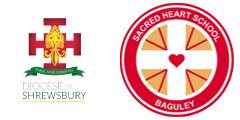History Statement
‘With joyful hearts, we love, learn and praise as the family of God’
Intent
At Sacred Heart, we believe that history should inspire pupils’ curiosity to ask questions and know more about Britain’s past and that of the wider world. Pupils should be encouraged to develop a chronological framework of British history that will enable them to make sense of the new knowledge they acquire. We want our pupils to understand that history is constructed and contested; we aim to nurture inquisitive children who are able to ask questions and make reasonable judgments about the past. The units taught through history enable pupils to construct arguments and support them to become analytical thinkers who can question human motivation and society with skill and confidence.
Units of study are informed by the national curriculum and have been designed to ensure progression. We have carefully planned and structured our curriculum to ensure that current learning is linked to previous learning and that the school’s approaches are informed by current pedagogy. Our history curriculum has been designed to consider the context of our school and the locality of our pupils. We aim to counteract the effects of deprivation, whilst giving pupils the knowledge, skills and cultural capital they need to succeed.
In line with the national curriculum, the history curriculum at Sacred Heart aims to ensure that all pupils:
Gain a coherent knowledge and understanding of Britain’s past and that of the wider world which helps to stimulate pupils’ curiosity to know more about the past.
Are encouraged to ask perceptive questions, think critically, weigh evidence, sift arguments, and develop perspective and judgement.
Begin to understand the complexity of people’s lives, the process of change, the diversity of societies and relationships between different groups, as well as their own identity and the challenges of their time.
Implementation
Please click here to see the Long Term Plan for this year.
In ensuring high standards of teaching and learning in history, we implement a curriculum that is progressive throughout the whole school. History is taught as part of a half-termly topic, focusing on knowledge and skills stated in the National Curriculum. At the beginning of each topic, children are able to convey what they know already as well as what they would like to find out.
Beginning in Early Years, children begin to acknowledge that as they grow they are able to do more for themselves. They show an understanding of themselves and the world around them. The children become increasingly aware of the changes in routine during different times of the day and seasons in the year and that these changes impact what they can do.
Within Key Stage one, our History curriculum helps our pupils to understand the lives of significant people from the past, as well as events beyond living memory and the process of change and similarities and differences.
In Key Stage two, all children will know and understand history as a chronological narrative; from the earliest of times to modern day. Children will continue to understand the process of change, the diversity of societies, relationships between different groups and the cause and effect.
Children will develop their understanding of the role that Britain has played in the history of the world and how we have been influenced by other nations. Our curriculum seeks to develop pupils’ historical enquiry skills, knowledge, understanding and communication skills. The curriculum has been designed progressively to ensure children develop an increasingly more sophisticated historical perspective of the world.
Impact
The skills we endeavour to equip our pupils with through our history curriculum will be transferable to many other parts of the curriculum. The impact of the curriculum is evaluated by the subject leader and the teachers for each phase. The subject leader monitors the teaching and learning in history throughout the year. This involves looking at the children’s work in books and lessons, the planning, staff and pupil voice.
Through our history curriculum children will:
• Gain skills of critical thinking and acquire and effectively use new vocabulary.
• Develop the ability to weigh evidence and to think through an argument.
• Build judgement and perspective through chronological studies.
• Develop research, interpretation and presentation skills which can then be disseminated using ICT and Art and Design mediums.
Using guidance from the Historical Association we have embedded principles for assessing and evaluating the progress of pupils. Common techniques are used throughout the school and children are given the opportunity to practice the same skills over and over again, revisiting key content and vocabulary. Each child has a progress ladder against which they demonstrate their skills. We recognise that attitudes have the biggest impact on learning and encourage pupils to see themselves as historians.
